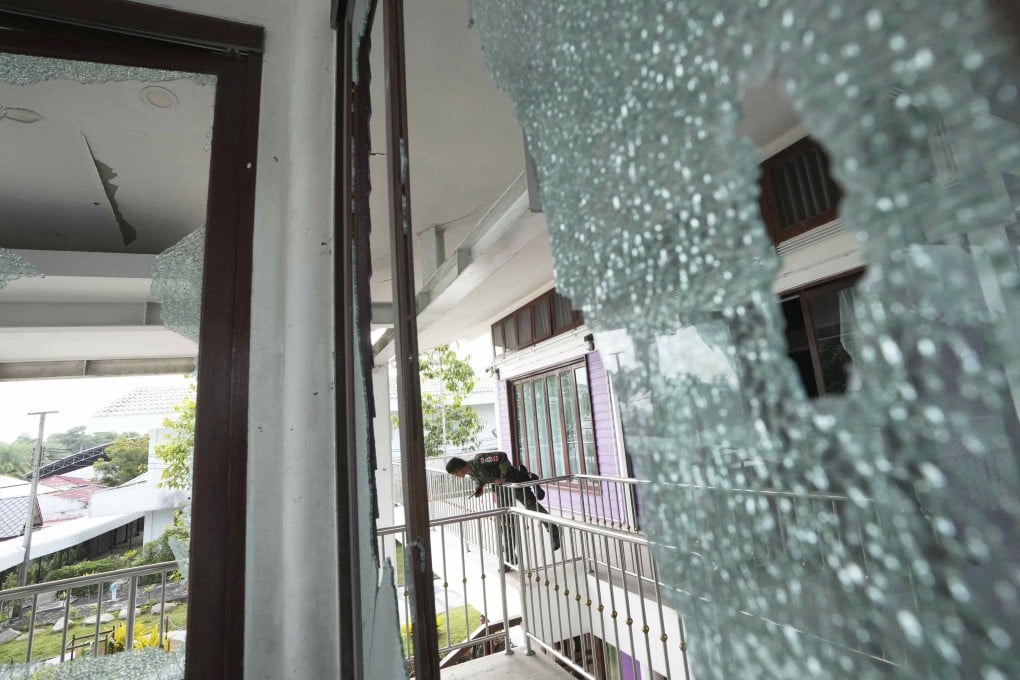Foreign ministry says it hosted ‘candid, friendly and conducive’ three-way talks in Shanghai following the recent border ceasefire

A Thai soldier inspects damage at a hospital caused by the recent fighting. Photo: AP
Orange Wangin Beijing
Published: 9:26pm, 30 Jul 2025Updated: 10:57pm, 30 Jul 2025
scmp
China held talks with representatives from Thailand and Cambodia on Wednesday as efforts to defuse tensions following the recent deadly border clashes continued.
The three-way discussions in Shanghai, hosted by vice-minister for foreign affairs Sun Weidong, secured a commitment from both sides to abide by the ceasefire and were described by Beijing as an “informal consultation” given the “fragile situation” on the ground.
Underscoring that fragility, the two sides continued to trade accusations on Wednesday, with Thailand accusing Cambodian forces of a “flagrant” violation of the ceasefire – claims Phnom Penh rejected as “misleading and fabricated”.
Chinese foreign ministry spokesman Guo Jiakun told a press conference later in the day that the meeting took place in a “candid, friendly and conducive” atmosphere and both sides had “reaffirmed to China their commitment to upholding the ceasefire”.
Guo added that Beijing was working to “create conditions for the early restoration of peace and stability” along the Thai-Cambodian border.
“We stand ready to maintain close communication with Cambodia, Thailand and Malaysia and other regional countries to play a constructive role in cementing the ceasefire agreement and to restore regional peace and stability,” Guo said.
He added that Beijing supported the Association of Southeast Asian Nations (Asean) “in advancing a political settlement”.
China did not name the Thai or Cambodian delegates, but photos released by the foreign ministry in Beijing showed Sun standing with Kung Phaok, a Cambodian government minister responsible for foreign affairs, and Jullapong Nonsrichai, an executive adviser to the Thai foreign ministry.
The latest round of fighting began last week after a landmine explosion wounded five Thai soldiers following months of escalating tensions. The fighting killed at least 41 people and forced hundreds of thousands to flee their homes.
Cambodian Prime Minister Hun Manet and Thailand’s acting prime minister Phumtham Wechayachai agreed to a ceasefire at midnight on Monday after talks hosted by Malaysian Prime Minister Anwar Ibrahim, the current chairman of Asean.
The talks in Kuala Lumpur were co-organised by the United States, while Chinese representatives also attended.
On Wednesday morning, the Thai foreign ministry said troops in a border province “came under attack by small arms fire and grenade assaults launched by Cambodian forces” less than 24 hours after the ceasefire agreement.
However Cambodia accused Bangkok of “distorting the facts on the ground and dangerously threatening the fragile trust and dialogue essential for lasting peace”.
“Cambodia reiterates that it has no intention, now or in the future, of breaching the ceasefire,” it added.
Underscoring its commitment to peace efforts, China also said on Wednesday that Liu Jinsong, head of Asian affairs at the foreign ministry, had recently met the Thai and Cambodian ambassadors for “in-depth and friendly exchanges on bilateral relations and issues of mutual concern”.
Thailand-Cambodia border fighting drives mass exodus as attacks mount
Meanwhile, Chinese Foreign Minister Wang Yi also stressed that Beijing would play a “constructive role” in a meeting on Friday with Asean secretary general Kao Kim Hourn.
He also said that the conflict “stems from the enduring damage caused by Western colonisers” – an apparent reference to the border dispute’s roots in an early 20th century treaty between the French colonial authorities in Cambodia and what was then the Kingdom of Siam.

No comments:
Post a Comment